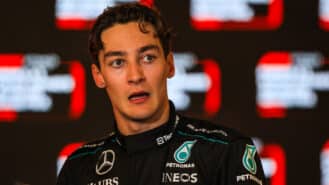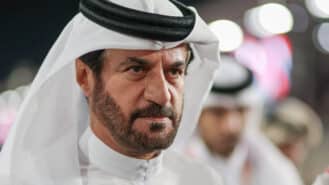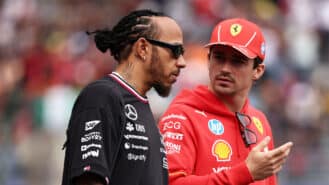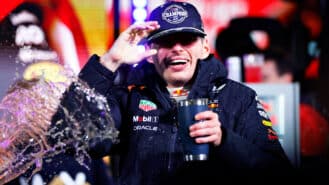
Verstappen proves Russell right: Abu Dhabi GP 2024 – Up/Down
Verstappen's prang at the first corner of the F1 finale in Abu Dhabi vindicated George Russell's recent rant
At 9am this morning, Jaguar announced that it had cancelled the C-X75 supercar programme.
First shown in September 2010 and confirmed for production the following Spring, the radical hybrid seen by many as the replacement for the XJ220 will now not be sold to the public. Instead five of the Williams-developed prototypes will be completed to be used as mobile R&D test beds for future Jaguar product.
How has this come about? Eighteen months ago Jaguar said there was ‘a clear business case’ for the car and that ‘no other vehicle will better signify Jaguar’s renewed confidence and excellence in technological innovation than this’. Today the line is ‘the company’s view is that the global economic landscape does not currently support the introduction of a supercar such as C-X75’.
If your memory needs a jog, the C-X75 was originally shown as a range extender hybrid using tiny micro-turbines in place of an internal combustion engine. By the time production was announced this technology remained in the research phase so a new approach was adopted, using a 1.6-litre four cylinder engine that sounded rather conventional until you realised it was turbocharged and produced 500bhp at 10,000rpm in conjunction with electric motors driving each of the cars axles. The extraordinary claims for the production car were 0-60mph in less than 3sec, 0-100mph in less than 6sec, a top speed of over 200mph and CO2 emissions of no more than 99g/km, putting it on a par with a diesel powered Ford Fiesta.
Jaguar said it would build no more than 250 examples of the car each costing between £700,000-£900,000.
It’s sad that the car has been killed but it is hard to see it as anything other than the right decision. Despite broadly credible product, Jaguar is still struggling to sell more than 50,000 units a year. Compare that to the 1.25 million minimum that Audi, BMW and Mercedes manage and you’ll have some idea of what it is up against. It’s expanding its line up to take advantage of specific market requirements – making four-wheel drive XFs and XJs for North America, a 3-litre petrol XJ for China, an estate XF and so on – but it’s still an essentially three model range, four if you include the forthcoming F-type. Audi has twelve, off most of which it spins myriad convertibles, coupes, estates and so on. It is that imbalance Jaguar needs to be fighting now, and if cancelling an interesting vanity product helps that process I’m all for it.
Consider also that since the C-X75 was first shown to the world, Porsche, Ferrari and McLaren have all announced they’re building hybrid hypercars too. Is that a fight Jaguar really wants to take on?
If it is not, the reasons are understandable. Cast your mind back 20 years to the launch of the XJ220. This too was a radical Jaguar supercar launched in rather different form to that suggested by its original concept to an economically precarious world while all around its rivals readied even more powerful and exotic opponents. The XJ220 tanked and so did all the others from the Bugatti EB110 to the McLaren F1, which was only rescued in part by a racing career it was never meant to have.
That said, I still think Jaguar needs a halo product, a headline-hungry ambassador that declares Jaguar’s sporting intent, is respectful to its past, relevant to its future and capable of sprinkling some much needed star dust on its normal cars. Jaguar says it will remain in business with Williams: is it too much to hope it may be charged with creating Jaguar’s first purpose built racing car since the XJR-14 on the cover of this month’s Motor Sport?

Verstappen's prang at the first corner of the F1 finale in Abu Dhabi vindicated George Russell's recent rant

FIA president Mohammed Ben Sulayem seemed intent on making F1 a united front by the end of the 2024 Qatar GP – against him

Leclerc erupted after feeling wronged one time too many by Sainz in Vegas – but the challenge posed by his team-mate next year, Lewis Hamilton, will be much greater writes James Elson

2024 has been Max Verstappen's masterclass – it should go down in history as one of F1's greatest titles